#olena kalytiak davis
Text
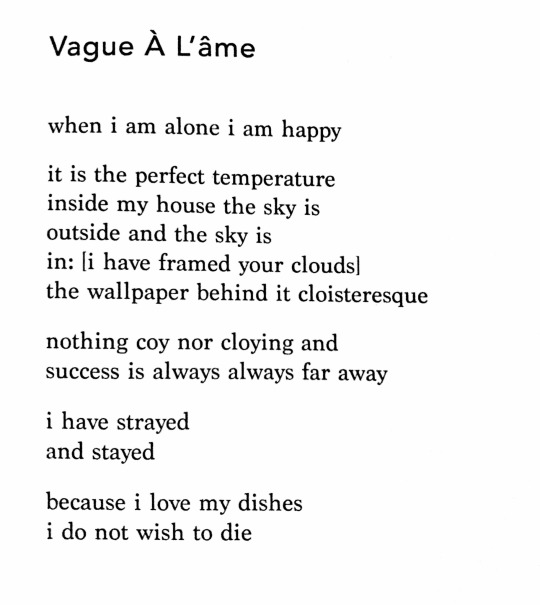
Olena Kalytiak Davis, from Late Summer Ode
2K notes
·
View notes
Text

Olena Kalytiak Davis, from Shattered Sonnets, Love Cards, and Other Off and Back Handed Importunities; "she (as sonnet)"
[Text ID: I was so weighed down: anchor-hearted, lead-souled.]
#olena kalytiak davis#shattered sonnets love cards and other off and back handed importunities#she (as sonnet)#words#poetry#typography#anchor-hearted….
815 notes
·
View notes
Text

Olena Kalytiak Davis
328 notes
·
View notes
Text

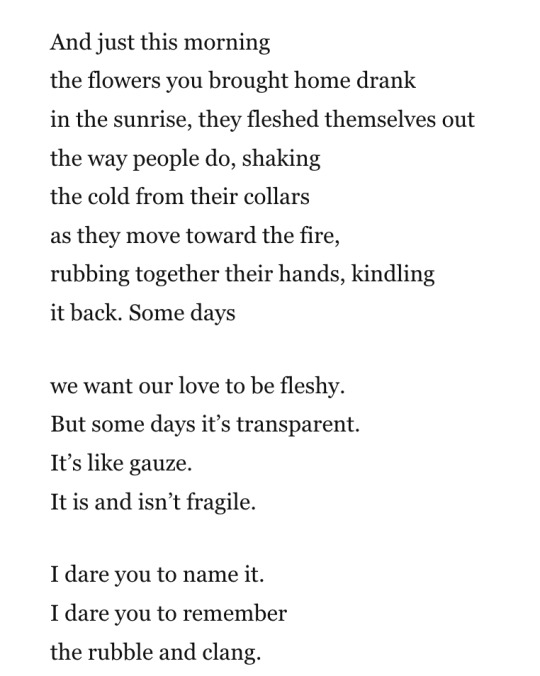
“The Gauze of Flowers, A Love Poem” by Olena Kalytiak Davis
124 notes
·
View notes
Text
The moon is sick
of pulling at the river, and the river
fed up with swallowing the rain,
So, in my lukewarm coffee, in the bathroom
mirror, there's a restlessness
as black as a raven.
Landing heavily on the quiet lines of this house.
Again, the sun takes cover
and the morning is dead
tired of itself, already, it's pelting and windy
as I lean into the pane
that proves this world is a cold smooth place.
Wind against window---let the words fight it out---
as I try to remember: What is it
that's so late in coming? What was it
I understood so well last night, so well it kissed me,
sweetly on the forehead?
Wind against window and my late flowering brain,
heavy, gone to seed. Pacing
from room to room and in each window
a different version of a framed woman
unable to rest, set against a sky
full of beating wings and abandoned
directions. Her five chambered heart
filling with the panic of birds, asking: What?
What if not this?
The Panic of Birds by Olena Kalytiak Davis
24 notes
·
View notes
Text
"Spring is cheap, but clean of sky. Long after she used to / meet him on the sly."
Read it here | Reblog for a larger sample size!
#closed polls#polls#poetry#poems#poetry polls#poets and writing#tumblr poetry#have you read this#in the clear long after#olena kalytiak davis
2 notes
·
View notes
Text
[Blog #10] Spring 2023, Plath, Sexton and Lowell vs Olds, Flynn and Davis
Today, I am comparing and contrasting early Confessional poets -- Sylvia Plath’s “Lady Lazarus,” Anne Sexton’s “Wanting to Die” and Robert Lowell’s “Skunk Hour” -- to their Confessional contemporaries -- Sharon Olds’ “My Son the Man,” Nick Flynn’s “My Mother Contemplating Her Gun” and Olena Kalytiak Davis’ “Not This”.
For reference, confessional-style poetry or confessionalism is poetry that often incorporates first-person perspective to detail psychological struggles such as mental illness and/or childhood traumas.
Before I analyze the similarities and differences between those six poems, I would love to greet anyone who happens to stumble upon this blog post.
This is the link to my first blog post on Ada Limon’s The Carrying (2018):
My professor assigned a poetry book collection or individual poems every other week. My main objective was to dissect a few poems that left an impression on me while using his T.R.I.F.F.I.D. method.
Tone: the voice, mood, or attitude the reader believes the author is conveying through subject and word choice.
Rhythm: the pattern and beat between the stressed and unstressed word syllables.
Imagery: the details told through the five senses (touch aka physical, sound aka auditory, sight aka visual, taste aka gustatory and smell aka olfactory).
Figure: or figure of speech, is the non-literal expression of language. Figures of speech include hyperbole, irony, metaphor, simile, anaphora, antithesis and chiasmus.
Form: the way a poem is presented on paper or a screen. Think of how the author physically shapes the poem -- the use of dialogue, line spacing, paragraph breaks, rhythms and patterns.
Idea Density: how the author expresses their ideas throughout their poem. Can be literal (concrete) and/or figurative (vague or hidden).
Diction: the word choice and arrangement within a piece.
Part I:
The most noticeable difference between early and contemporary confessional poems are their forms. For example, both Sylvia Plath’s “Lady Lazarus” and Anne Sexton’s “Wanting to Die” have 3 lines per stanza, while Robert Lowell’s “Skunk Hour” has 6.
On the other hand, Sharon Olds’ “My Son the Man” is one long stanza compose of 15 lines; Nick Flynn’s “My Mother Contemplating Her Gun” is a bit harder to deduce where a stanza starts and end, but it seems to vary between 1–3 lines per stanza. Olena Kalytiak Davis’ “Not This” starts at 2 lines, then 11, and shifts back to 2 lines for the last three stanzas.
Part II:
I feel as though I can’t quite compare and contrast the early and contemporary poets’ idea density because they all similarly discuss mental health awareness/topics. Plath’s “Lady Lazarus” (Lazarus means a person who is resurrected from the dead) reveals the narrator’s (Plath’s) third suicide attempt by age thirty:
I have done it again.
One year in every ten
I manage it——
(...)
And I a smiling woman.
I am only thirty.
And like the cat I have nine times to die.
This is Number Three.
What a trash
To annihilate each decade. (1-3, 21-24)

Lowell’s “Skunk Hour” the narrator admits to his declining mental health -- feeling crazy, alone and depressed, so much so, he compared his state of mind to Hell:
My mind’s not right.
A car radio bleats,
“Love, O careless Love. . . .” I hear
my ill-spirit sob in each blood cell,
as if my hand were at its throat. . . .
I myself am hell;
nobody’s here— (30-36)
Sexton’s “Wanting to Die” is vaguely similar in topic to Plath as they both discuss “suicide,” though Sexton is more on the nose than Plath. In reference to the title, the narrator confesses to her desire to commit suicide:
Since you ask, most days I cannot remember.
I walk in my clothing, unmarked by that voyage.
Then the almost unnameable lust returns.
Even then I have nothing against life.
I know well the grass blades you mention,
the furniture you have placed under the sun.
But suicides have a special language.
Like carpenters they want to know which tools.
They never ask why build. (1-9)
Olds’ “My Son the Man” the narrator confesses that she is afraid of her son growing up and becoming his own person outside of her control/influence (maternal fears).

She compares herself to the chains strapped on Houdini, while her son is compared to Houdini himself:
Suddenly his shoulders get a lot wider,
the way Houdini would expand his body
while people were putting him in chains. It seems
no time since I would help him to put on his sleeper,
guide his calves into the gold interior,
zip him up and toss him up and
catch his weight. I cannot imagine him
no longer a child, and I know I must get ready,
get over my fear of men now my son
is going to be one. This was not
what I had in mind when he pressed up through me like a
sealed trunk through the ice of the Hudson,
snapped the padlock, unsnaked the chains,
and appeared in my arms. Now he looks at me
the way Houdini studied a box
to learn the way out, then smiled and let himself be manacled. (1-15)
Eventually, like all traps, Houdini figures them out and escapes, which is what the narrator fears her son will do to her when he matures.
Again, Flynn’s “My Mother Contemplating Her Gun” is similar to Plath and Sexton’s poems as it deals with the topic of suicide; as the title implies, the narrator is the mother.
Throughout the poem, the mother discusses the gun -- the act of suicide -- as insignificant or easy by down-playing the severity and adding colorful descriptions to the gun:
I bought it
when I didn’t feel safe. The barrel
is oily,
reflective, the steel
pure, pulled from a hole
in West Virginia. It
could have been cast into anything, nails
along the carpenter’s lip, the ladder
to balance the train. Look at this, one
bullet,
how almost nothing it is—
saltpeter sulphur lead Hell
burns sulphur, a smell like this.
safety & hammer, barrel & grip
I don’t know what I believe. (9-23)
Lastly, in Davis’ “Not This,” the narrator reveals she regrets not appreciating the little moments of family time in the past since the family dynamic has change -- the children growing up and the narrator (possibly) falling out of love with their spouse:
i raised my kids, they
grew i lost two pasts–i am
not made of them and they
are through.
we forget what
we remember:
each of the five
the fevered few
days we used to
fall in love. (10-19)

What did I learn?
The most noticeable difference between early and contemporary confessional poems are their forms; early poets stuck to a rigid line count, while their successors are more free-flowing.
Moreover, they all discuss mental health issues. Plath, Sexton and Flynn explore suicide in their poetry; Lowell, Olds and Davis wrote about varying topics: solitude, maternal fears and regret.
Whether early or contemporary, not all poets write about the same mental issues; even if two poets wrote about the same mental illness, they have differing voices, imagery, figures of speeches, etc.
Though, most confessional poets seem to share the same tone: melancholy, desolate, grim, mournful and pessimistic.
Spotlight Poet: Who is Sylvia Plath?
Some may only know Sylvia Plath by how she infamously died, rather than how she lived her life. I am here to correct that! Boston native Sylvia Plath specialized and was highly noted for her confessional poetry; her topics ranged from her mental struggles, self-image and familial and marital traumas. During her lifetime, Plath published two poetry collections: The Colossus and Other Poems (1960) and Ariel (1965).
One of her most well-known and studied poems is “Lady Lazarus” and “Daddy”. In the former, as discussed earlier, Plath confesses to her third suicide attempt, whereas in the latter, she recounts her patriarchal sufferings through her father’s death and the conflicting relationship with her husband (poet Ted Hughes).
In the end, Sylvia Plath’s poetry remained timeless and praised by her contemporaries and successors because of how relatable and descriptive her thoughts and emotions -- anguish, alienation and self-destruction -- are to the past and present literary communities.
For more information on confessionalism and poetry by Plath, Sexton, Lowell, Olds, Flynn and Davis, check out the links below:
Lastly, what are some of your favorite confession-style poems?
Feel free to share some below!
#poetry review#poetry book#poetry recs#Sylvia Plath#Anne Sexton#Robert Lowell#poems#early poetry#contemporary poetry#sharon olds#nick flynn#olena kalytiak davis#confessional poetry
6 notes
·
View notes
Text
A poem by Olena Kalytiak Davis

Corruptive
The dark wood after the dark wood: the cold
after cold in April's false November.
In that second worser place: more gone, less there,
but in that lurid present present, cast and held,
rooted, kept, like some old false-berried yew.
Just against; the door leading to preferment
shut; no longer believing in still, by some, few
means, method, could be, but for the bad day set,
left, leaning atop bad day.
Out- and un-
ranked, toothached, wronged— rankled corruptive thing!
Ill-wishing, in-iquitous, clipped, up-hoped, stripped: just plain: thin.
Dare thou commit: commit this final fatal sin:
God my God, I am displeased by spring.

Olena Kalytiak Davis
Olena Kalytiak Davis writes: Seems the wrack of not living up to/meeting spring (much less National Poetry Month) is a recurrent theme for me. This is last April’s version/stunted bud. I think of it as a little Hopkinsesque, but it was in fact inspired/shaped by Donne’s discontent, that of the spring of 1608(!), (after the king dashed his hopes of getting a state job). Perhaps the part of the tradition I feel closest to...
4 notes
·
View notes
Photo

Olena Kalytiak Davis, author of Late Summer Ode (Copper Canyon Press, 2022), in Ten Questions.
#Olena Kalytiak Davis#Late Summer Ode#Writing#Poetry#Fiction#Inspiration#Quote#Writer's Block#Writer's Life#Copper Canyon Press
6 notes
·
View notes
Quote
The dark wood after the dark wood: the cold
after cold in April's false November.
In that second worser place: more gone, less there,
but in that lurid present present, cast and held,
rooted, kept, like some old false-berried yew.
Just against; the door leading to preferment
shut; no longer believing in still, by some, few
means, method, could be, but for the bad day set,
left, leaning atop bad day.
Out- and un-
ranked, toothached, wronged— rankled corruptive thing!
Ill-wishing, in-iquitous, clipped, up-hoped, stripped: just plain: thin.
Dare thy commit: commit this final fatal sin:
God my God, I am displeased by spring.
“Corruptive”, Olena Kalytiak Davis
0 notes
Text
Not This // Olena Kalytiak Davis
my god all the days we have lived thru
saying
not this
one, not this,
not now,
not yet, this week
doesn’t count, was lost, this month
was shit, what a year, it sucked,
it flew, that decade was for
what? i raised my kids, they
grew i lost two pasts–i am
not made of them and they
are through.
we forget what
we remember:
each of the five
the fevered few
days we used to
fall in love.
0 notes
Text

Olena Kalytiak Davis, from Shattered Sonnets, Love Cards, and Other Off and Back Handed Importunities; "in the clear long after"
#olena kalytiak davis#shattered sonnets love cards and other off and back handed importunities#in the clear long after#words#poetry#typography#a dream ago perhaps
689 notes
·
View notes
Photo

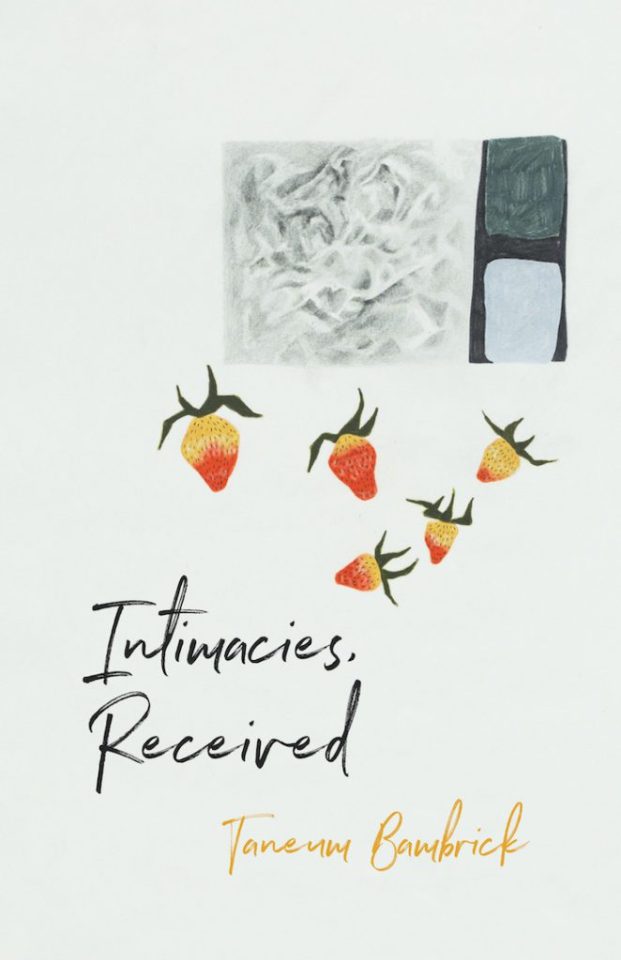
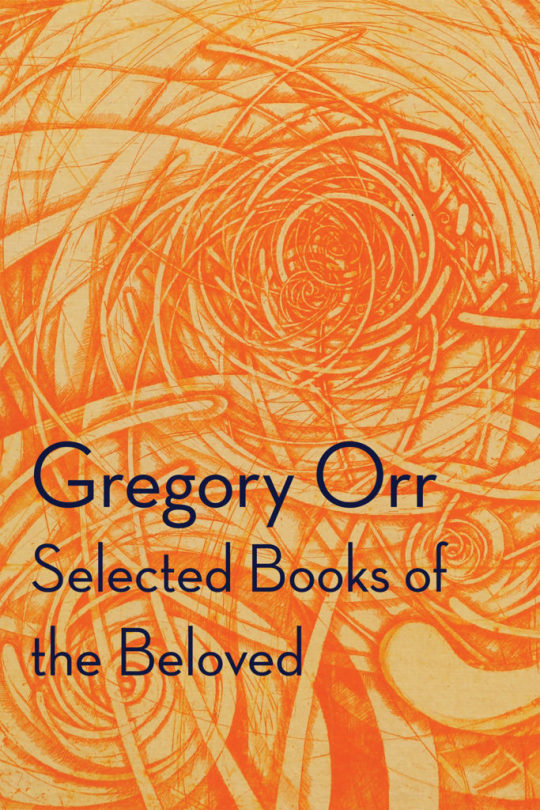
some new and soon-to-be published poetry collections from copper canyon press
1 note
·
View note
Text
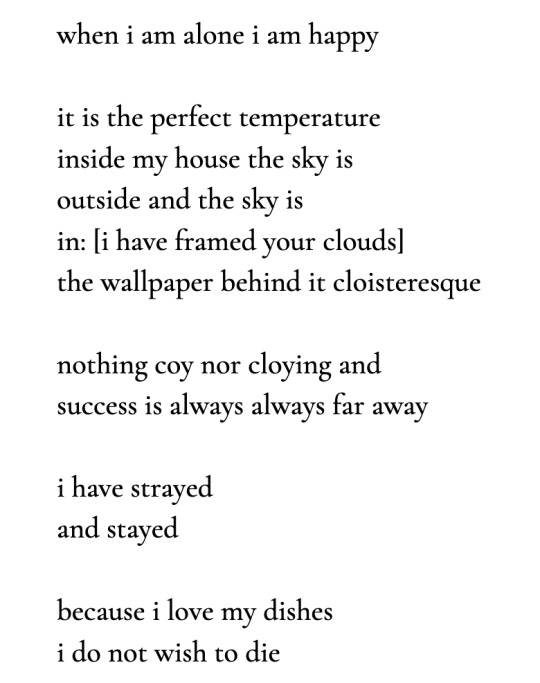
vague à l’âme by Olena Kalytiak Davis
2 notes
·
View notes
Text
The dark wood after the dark wood: the cold
after cold in April's false November.
In that second worser place: more gone, less there,
but in that lurid present present, cast and held,
rooted, kept, like some old false-berried yew.
Just against; the door leading to preferment
shut; no longer believing in still, by some, few
means, method, could be, but for the bad day set,
left, leaning atop bad day.
Out- and un-
ranked, toothached, wronged—rankled corruptive thing!
Ill-wishing, in-iquitous, clipped, up-hoped, stripped: just plain: thin.
Dare thy commit: commit this final fatal sin:
God my God, I am displeased by spring.
Corruptive by Olena Kalytiak Davis
1 note
·
View note
Text

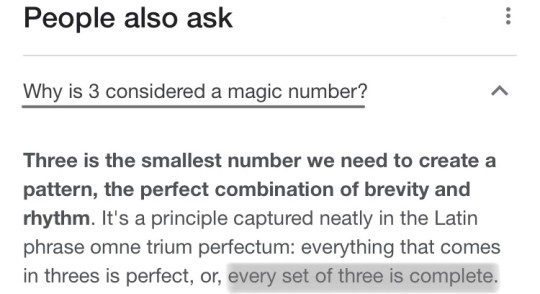














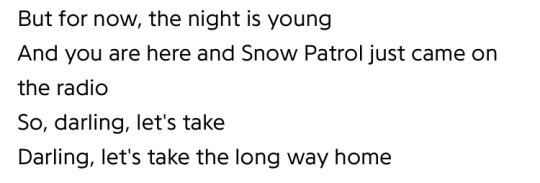




hell was the journey but it brought me heaven: welcome home, george.
georgenootfound // why three is the magic number // dream, on soulmates // dream team discord icons // home, edward sharpe & the magnetic zeros // correspondence, albert camus to maria casarès // the kids aren’t alright, fall out boy // sapnap and dream // friedrich nietzsche // george and sapnap // dreamygeorgenap // shattered sonnets, love cards, and other off and back handed importunities, olena kalytiak davis // dream and george // first day of my life, bright eyes // georgenotfound // today is the first day of the rest of my life, john denver // on the drive home, NIKI // beetlejuices // in the café of lost youth, patrick modiano // dream, sapnap, and georgenotfound // flesh of mine, novana venerable
#dream team#dreamwastaken#georgenotfound#sapnap#my web weaves#i've stared at this thing for so long i really have no idea how i feel about it anymore#but i wanted to make something so <3 hope it's alright#1k
1K notes
·
View notes